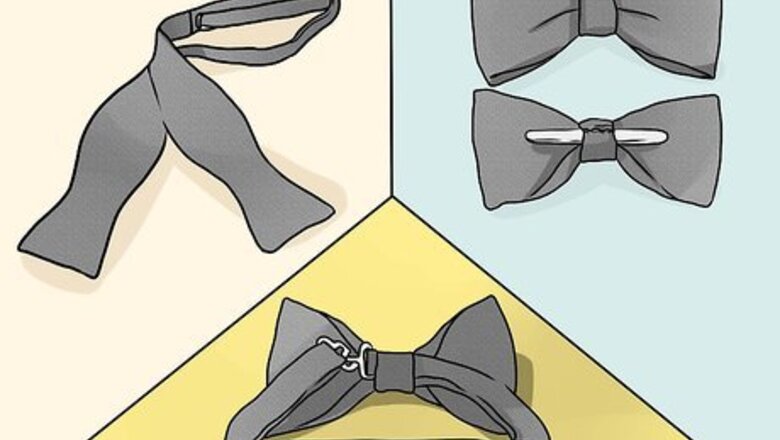
views
Choosing Your Bow Tie
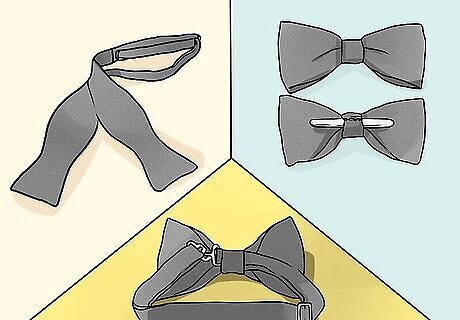
Choose between a self-tie, ready-tie, or clip-on bow tie. The self-tie is highly recommended. Clip-on bow ties are mainly for children, and while the ready-tie might do for a beginner, wearing one at a formal event is considered a faux pas. Be warned: people can spot the difference.
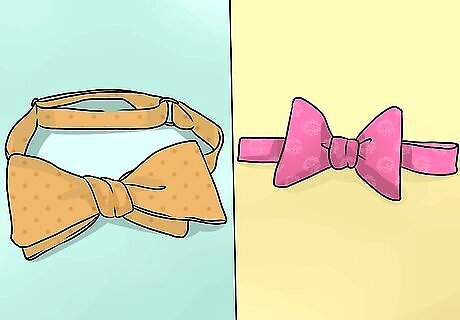
Choose between a fixed-size or adjustable bow tie. Most bow ties sold are adjustable, but for style purposes, the fixed-size bow tie is preferable. The main advantage of a fixed-size bow tie is that the width of the finished bow will be directly proportional to your neck size. In addition, fitted models will avoid excess fabric and clasps, which may be visible when worn with a wing collar shirt. Adjustable bow ties – The neck strap on the tie will have an adjustable slider or hook and holes with pre-marked measurements. Adjust the tie to match the collar size of your shirt. The tie should be snug but not too tight. Fixed size – To be certain you have the correct size, have your neck measured by a tailor or buy a tie that matches the size of your shirt collar. The tie should be snug but not too tight. When tied, the bow should fall between the outer edge of your eyes and the width of your face.
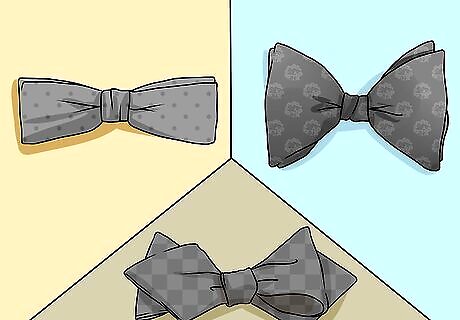
Pick a style of bow tie. Bow ties come in several different shapes. The style you pick is mainly about personal taste. Butterfly – Also known as the “thistle”, this is the bow tie people are most familiar with. When the tie is laid flat, the ends are shaped like a butterfly. The butterfly works best with winged collars. Big Butterfly – A larger version of the butterfly, most often used on very formal occasions. It also works best with winged collars. Bat Wing – Also known as the “straight” or “narrow” bow tie. When laid flat, the ends look like cricket bats or oars. The bat wing is more modern and less formal, though still suitable for black tie events. They work better with standard collars. Diamond Point or Rounded Club – These ties have pointed or rounded ends, which when tied gives them an added asymmetric look. They are less common, but can still be worn for formal occasions.

Choose a bow tie to match the occasion. The fabric and color you choose for your bow tie depends largely on where you will be wearing it. The more casual the occasion, the more freedom you have in choosing your bow tie.
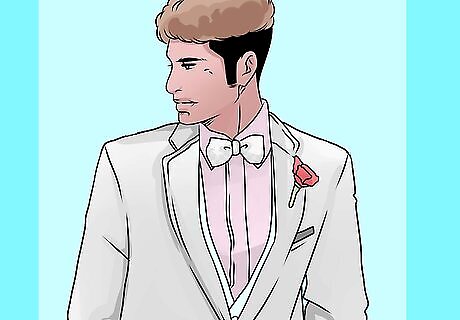
Wear a white bow tie for white tie events. This is the most formal type of dress, reserved for state dinners, and very formal balls or evening weddings. Your bow tie should be white and pure silk. Its texture should match the lapel of your tuxedo jacket.
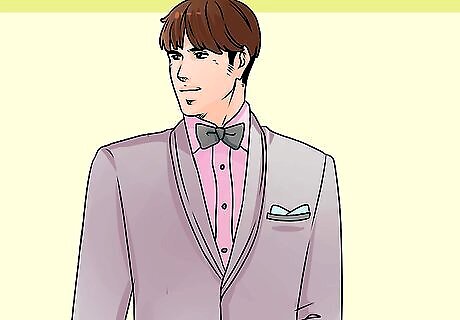
Wear a black bow tie for black tie events. Black tie events include the opera, formal dinners, and evening weddings. Traditionally, men should wear tuxedos and black bow ties. Again, the tie should be pure silk, and its texture should match the lapel of your tuxedo.
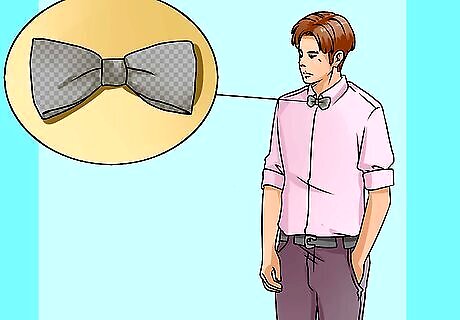
Try experimenting with color for creative black tie or semi-formal events. For these less formal occasions, a colored or patterned bow tie is permissible, and you may also experiment with different fabrics.
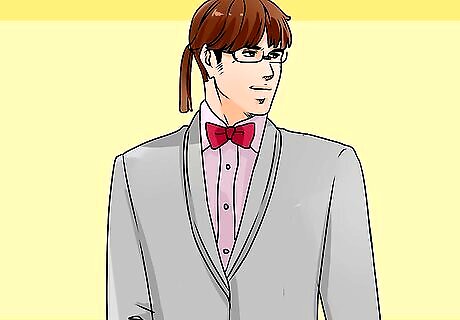
Make a statement by wearing a bow tie with your suit. A bow tie makes a statement all by itself, so it’s best to keep things simple. Stick with navy, black, or gray suits, and blue or white shirts. Let your bow tie make the statement. Because bow ties cover a small area, you can be bolder with design than with a traditional tie. Stripes are a safe place to start when trying patterns, but don’t be afraid to experiment with polka dots or paisley. Consider wearing your bow tie with a more tightly fitted jacked. A bow tie and loose jacket might make you look too much like a professor.
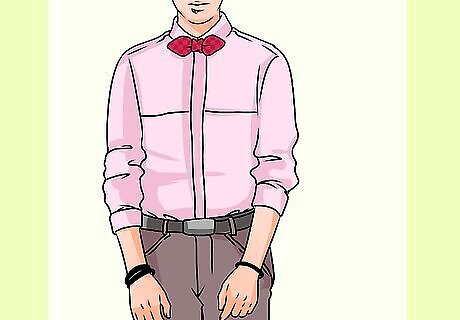
Add style to your casual attire. A bow has become a staple of hipster chic, but even for the non-hipsters among us, a bow tie can spice up a shirt and blazer or a simple button down shirt. They give you an intellectual look, combined with an old-timey aesthetic and just a hint of mischief. Make sure to wear your bow tie with a slim-fitting shirt. An ill-fitting shirt combined with a bow tie will make you look stodgy. Experiment with different materials, such as bow ties made of linen, cotton, wool, flannel, denim or even wood (yes, wood!) not shiny silk, which is more appropriate to formal attire.
Wearing your Bow Tie
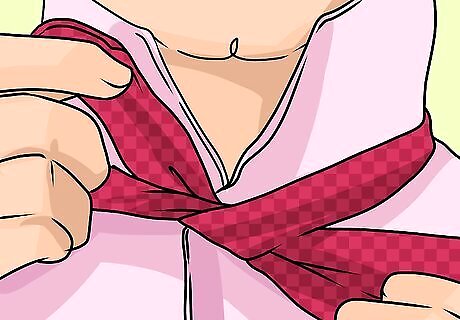
Tie your bow tie. Be sure to practice a couple of times before you need to wear your tie. Like any other tie, tying a bow tie properly takes a little practice. Don't be discouraged if you don't get the perfect tie at first.
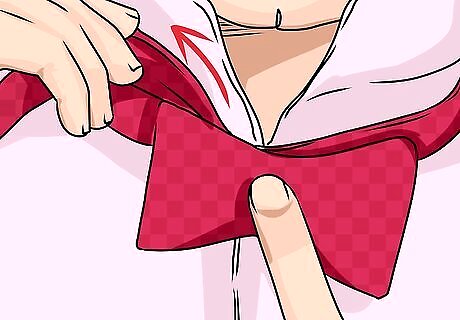
Pull at the loops carefully. Tighten the loops until you have adjusted the tie to your satisfaction. Pulling at the flat ends will only untie your tie.
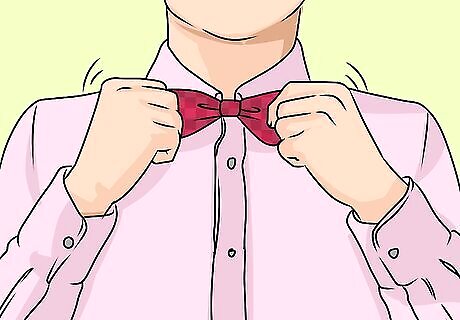
Check the length of the bow. Make sure the finished bow falls somewhere between the outer edges of your eyes and the width of your face. If not, you may need to adjust your knot, or the length of your bow tie.
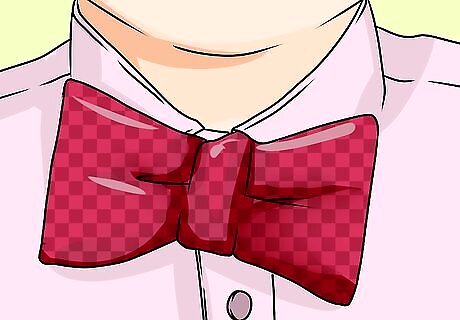
Do not worry if your tie is slightly asymmetric when tied. It is supposed to look that way. The small irregularities found in a self-tied bow tie give it charm. And the natural look of a self-tied bow tie helps it to stand out from the cookie-cutter look of ready-tied versions.
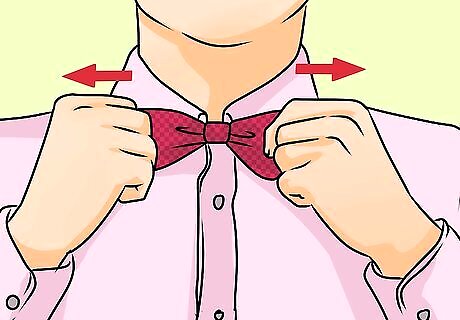
If wearing a wing collar shirt, tuck the wings of the collar behind the bowtie. This is the proper way to wear a tie with a wing collar according to etiquette. Also, this positioning helps to hold the tie in place.

















Comments
0 comment